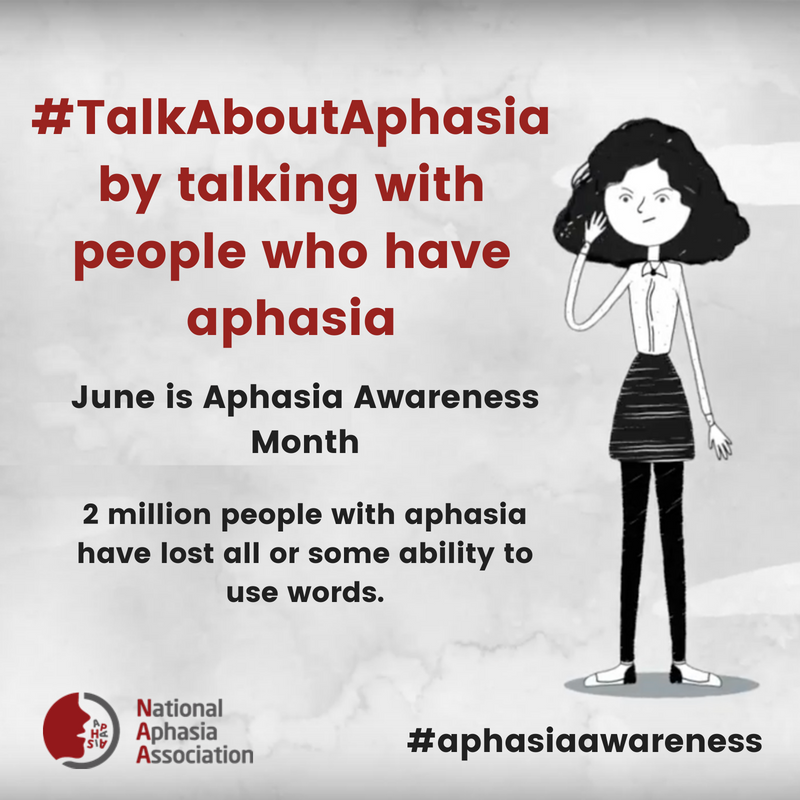Let’s Talk About Aphasia

What is Aphasia?
Aphasia is a language disorder that is caused by impairment to specific areas in the brain that control a person’s ability to understand and/or produce a spoken or written message.
According to a national survey by the National Aphasia Association, approximately 2 million people in the United States are living with Aphasia (Aphasia Fact Sheet, 2018).
What causes Aphasia?
The most common cause of aphasia is a stroke. Approximately 80-90% of aphasia cases result from a stroke; however, aphasia can also be caused by infection, brain tumor, or by more general conditions such as a nutritional deficiency or toxemia (extreme hypertension during pregnancy) (Brookshire, 2015).
What parts of communication can be affected by Aphasia?
- Comprehension of Speech. Understanding the meaning of familiar or unfamiliar words that are spoken to you.
- Comprehension of Written Messages. Understanding printed words in newspapers, magazines, books, text messages, etc.
- Spontaneous speech. Everyday speech that is spoken during conversation.
- Repetition of words.
- Reading aloud.
- Writing.
- Gestural Responses to Spoken Commands. “Show me how you wave goodbye.”
(Brookshire, 2015)
How does Aphasia affect the brain?
Our brains have “language centers” that help us to communicate and understand messages. These language centers are called Broca’s area and Wernicke’s area. Broca’s area helps our brain organize and plan the movement of our lips and tongue for speech so that our speech makes sense. Damage to this area will affect a person’s ability to produce normal speech. Wernicke’s area helps us understand and process written or spoken messages. Damage to this area will affect a person’s ability to understand speech or written messages.
What are the types of Aphasia?
There are a total of eight types of aphasia; however, some of the most commonly treated types are Broca’s, Wernicke’s, and Anomic.
Broca’s Aphasia. When damage to Broca’s area occurs, it appears that your brain has forgotten how to form a sentence. There may be abnormal pausing, speech sounds errors, and inability to form a complete sentence. Written messages will mirror their speech. Although speech is impaired, a person’s ability to understand speech and written messages remains in-tact.
Wernicke’s Aphasia. When damage to Wernicke’s area occurs, the brain has difficulty following simple commands or understanding the meaning of familiar vocabulary. In contrast with Broca’s aphasia, persons with Wernicke’s aphasia can talk smoothly and use long, well-formed sentences, though sentences may not make complete sense. These patients may also use “nonwords” or “gibberish” during conversation.
Anomic Aphasia.A person with anomic aphasia has difficulty naming items. Areas in the brain, such as Broca’s and Wernicke’s are not affected; the brain’s pathways that help us retrieve information from the language centers are damaged. For example, a person with anomic aphasia may look at a familiar object, such as a cup or spoon, and be unable to name that object. A person may easily be able to describe the object they are thinking but are unable to name it.
Are there any tips for family members or communication partners?
Here are some helpful tips to remember when communicating with someone that has aphasia. (Types of Aphasia, 2020).
- Speak slowly and clearly
- Use simple sentences and single words
- Write down key words in the conversation
- Use a variety of communication methods, including gestures, pictures, drawings, and technology
- Focus on communication that is immediately relevant to the situation
- Repeat or rephrase what is said
- Let the person with aphasia know if you are not understanding them

If you have a family member with aphasia or if you have further questions, we would be happy to help!
Aphasia Fact sheet. (2018, July 31). Retrieved from https://www.aphasia.org/aphasia-resources/aphasia-factsheet/
Brookshire, R. H., & McNeil, M. R. (2015). Introduction to neurogenic communication disorders. St. Louis, MO: Elsevier.
Types of Aphasia. (2020, April 25). Retrieved June 02, 2020, from https://www.aphasia.com/aphasia-resource-library/aphasia-types/
Monroe
West Monroe
Ruston
Shreveport
Monday-Friday
8am-5:30pm
Copyright © 2026 Melanie Massey Physical Therapy
